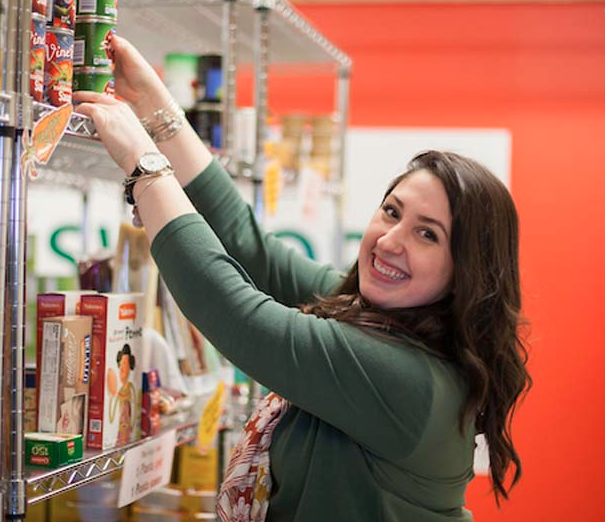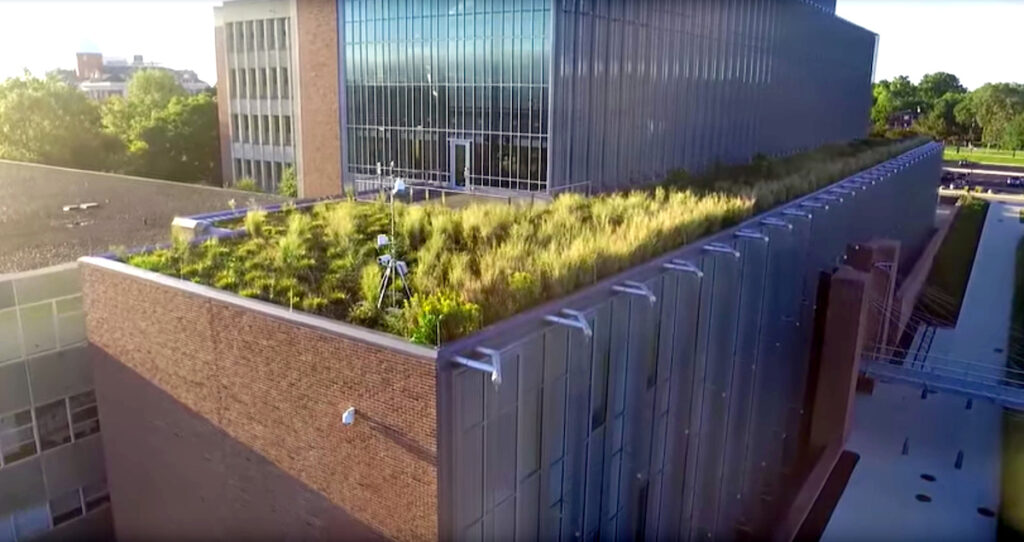Eastern Michigan University – Steam Heat, Solar Panels, and a Recent Bronze STARS Rating

Eastern Michigan University approaches sustainability through a systemized framework and a community-derived mindset that together drive several sustainability initiatives and sustainable infrastructure endeavors on campus. For its sustainability framework, EMU uses the Association for the Advancement of Sustainability in Higher Education (AASHE) and its Sustainability Tracking, Assessment and Rating System (STARS) system and has developed a President’s Sustainability Commission, comprising a broad array of offices and people across the university to develop and execute sustainable practices. SBN Detroit spoke to Tom Kovacs, chair of the president’s sustainability commission and professor of meteorology and climate in the Department of Geography & Geology, about EMU’s sustainability efforts. Q: What are some of the recent sustainability initiatives you’ve put into place? A: First, we are very proud to have completed our STARS certification process and received Bronze Certification. We know that there is room for improvement, which is what we are working on this year. One of the areas we scored lower on is engagement, so to that end, we are building sustainability information into our orientation for 2023 and also are doing a lot more to let people know the sustainability commission exists and inviting people in to help with our efforts. We also very recently partnered with a sustainable mobility solution – Spin Scooters – as the exclusive scooter provider on campus which is helping a lot with student and staff transportation. Another development is a new partnership with EnergySage. EnergySage provides a marketplace that connects interested parties to vetted installers. You simply list your needs, and the various installers provide you with a quote and basically compete for your business, so you ultimately get the best deal. There is also an educational component of EnergySage that offers advisors to help work through the options, as well as a full library of resources on clean energy, and how to live more sustainably. This collaboration helps us improve our STARS ranking and benefits the EMU community so it’s a win-win. Q: How is the university’s heat powered? A: We have a 55-ton cogeneration system that is powered by natural gas and produces electricity and steam. The system supplies approximately 98 percent of the heat and 93 percent of the electricity to the 800-acre campus. The unit will create an annual reduction of 21,305 tons of carbon dioxide (CO2), equivalent to 78.2 million miles driven by an average passenger vehicle – or the preservation of 260 acres of forests. Q: What are some other examples of campus infrastructure focused on sustainability? A: We have solar panels installed at bus stops lining the perimeter of campus and one in the middle of campus. The energy from the sun is stored in the battery assemblies to be utilized during the evening hours to keep travelers safe. We also have a student-led Giving Garden that provides an opportunity for staff, faculty, students, and Ypsilanti residents to grow fresh produce. It’s also used to educate local preschoolers and other students in the area. There is a new composting effort underway, and the garden provides locally grown food to the Swoops Pantry. Q: What is the Swoops Pantry? A: The Swoops Pantry was initiated by a former EMU student and is run by a leadership board of faculty, staff, students, and alumni volunteers. It operates as a sustainable resource for food-insecure students. There is a large stigma involved so they work hard to make things discreet and anonymous. Similar to Swoops, we also recently initiated an EMU Career Closet that provides apparel for students going on interviews. This is a great resource for those who don’t have the means to shop and purchase extra clothing. Q: The dining services in EMU dorms are managed by Compass Group’s Chartwells Higher Education Dining Services. What does this mean in terms of sustainable food practices? A: We shifted to privatized dining about six years ago and work with Compass Group to make dining a more sustainable endeavor. They’ve partnered with local community gardens; they work to incorporate composting; they work to limit waste; and they host a number of events such as Meatless Mondays and Farm to Fork luncheons. They also host a teaching kitchen. We have people from their team who volunteer on our Sustainability Commission, and they will be speaking at our student orientations on sustainability. Q: You also have an office supply program – Partnering for Sustainability. A: Yes, in 2019 we partnered with Office Depot. This allows the EMU community to purchase greener office products and select greener options when available. Recycled bags and reusable plastic totes are also used for delivery versus boxes. Q: What are your areas of focus for the near future? A: We’ll continue all of our efforts in the initiatives we’ve discussed here and seek to enhance them where appropriate. And again, coming off of the recent STARS certification process, our big focus is engaging the community in all of these efforts and more to work toward a greener campus and surrounding area. Be sure to subscribe to our newsletter for regular updates on sustainable business practices in and around Detroit.
The Role of Southeast Michigan Colleges and Universities in Sustainability

When it comes to sustainability, colleges and universities are in a unique position in that they must approach it from an implementation standpoint, but they also have the opportunity to deeply educate and affect the next generation in carrying sustainability actions forward. According to Rose Spickler, director of statewide engagement at the West Michigan Sustainable Business Forum (WMSBF), which runs the Campus Sustainability Collective, colleges and universities across the state are in various stages of their sustainability journeys. The WMSBF Campus Sustainability Collective is a collaboration between staff and faculty from campuses across Michigan that share resources to improve their respective sustainability goals. The group consists of representatives from over 20 Michigan campuses, including Eastern Michigan University, Siena Heights University, and Wayne State University. Eastern Michigan University began formal efforts around sustainability practices ten years ago and has seen continued passion and involvement from students. Five years ago, one student championed the goal of starting a President’s Commission on Sustainability on campus and four years ago, the commission was formed. Wayne State University established an Office of Sustainability in 2011 and has a five-year sustainability action plan in place. Siena Heights University, in Adrian, formed a Sustainability Committee in 2012 and has made progress in recycling, food choices, and the execution of a campus-wide energy audit. The institution is also incorporating sustainability into its curriculum. SBND spoke to all three institutions about their challenges, gains, and plans. Q: What are your main areas of focus and achievements to date when it comes to sustainability? Thomas Kovacs, Professor, Department of Geography and Geology, Eastern Michigan University Our President’s Sustainability Commission identified Sustainability Tracking Assessment and Rating System (STARS) and the Association for the Advancement of Sustainability in Higher Education (AASHE) as governing bodies to help us determine our framework, and we have been working within these guidelines toward sustainability. As such, our focus is academics, engagement, operations, and administration. On campus, a co-generation heat and power system has been installed to create an annual reduction of 21,305 tons of carbon dioxide, equivalent to the preservation of 260 acres of forests. The campus also has a bioswale designed to remove debris and pollution out of surface runoff water. It also serves as a living laboratory for students and staff. In 2020, Eastern Michigan University was ranked by U.S. News and World Report as 123 in the nation among 389 national universities, and among the top three national universities in Michigan in the social mobility category. We are very proud of this. Donna Kashian, Director of Environmental Science, and Professor of Biology, Wayne State University We established our Office of Sustainability in 2011 and it is a collaboration between groups. We have just submitted a new five-year plan that is very robust, and includes these subdivisions: Environmental justice Carbon reduction Built environment Water quality and quantity Energy Transportation/mobility Urban biodiversity Sustainable food practices Waste reduction We are more intentional now than ever before. Internally we focus on teaching, research, and facilities, and externally we are committed to doing a better job recognizing our place in the community with a larger focus on the greater Detroit area. We also network with leaders at other universities across the world to learn best practices in sustainability. Thomas Wassmer, Professor of Biology, Siena Heights University One of the areas we’ve been successful in is our curriculum. Recently we audited all course descriptions and found that 31% cover at least one of the 17 Sustainability Development Goals of the UN. That is a solid start, and we are working to increase this. One thing we are proud of is our William Issa Endowment Speaker Series where we invite extraordinary speakers in to educate on the environment and sustainability. We also feature an environmental documentary series that’s in its 14th season and is open to the students, staff, and public. What are your main goals going forward? Thomas Kovacs, Professor in the Department of Geography and Geology, Eastern Michigan University Our focus is to improve our STARS score and to work on communicating to the university how we plan to move ahead. I envision in the next two to three years we will greatly improve on our STARS scores. Donna Kashian, Director of Environmental Sciences, and Professor of Biology, Wayne State University We are excited about our new five-year plan and expect to move a lot of efforts forward in the upcoming months and years. For this plan, we called on specific people and groups and outlined action items – things they need to do. I expect to see a lot of visible changes on campus. We are also anticipating a big announcement in October regarding our carbon commitment. Thomas Wassmer, Associate Professor of Biology, Siena Heights University Using more renewable energy sources to reduce our carbon footprint, working toward a pesticide-free and chemical-free campus, and increasing its biodiversity. I’m a big advocate of maintaining our vegetative structures differently. We need to overcome the idea that to look inviting and well taken care of, the campus has to be perfectly manicured and blacktopped. We are working to get there. What has been most rewarding to you in your journey toward sustainability? Thomas Kovacs, Professor in the Department of Geography and Geology, Eastern Michigan University When I dug in, I saw so many people quietly working on campus trying to make things better who nobody knew about. Learning how much individuals care has been the most rewarding thing. For example, we had one person who was taking care of the grounds and working on recycling efforts and creating composting opportunities. Another person put boxes out at the end of the semesters during move-out times to collect electronics and such to avoid them going into landfills. These grassroots efforts matter and we are working to formalize plans and gain strength in collaborating. Donna Kashian, Director of Environmental Sciences, and Professor of Biology, Wayne, State University It’s been most rewarding seeing the passion of the students and faculty, many of which are


